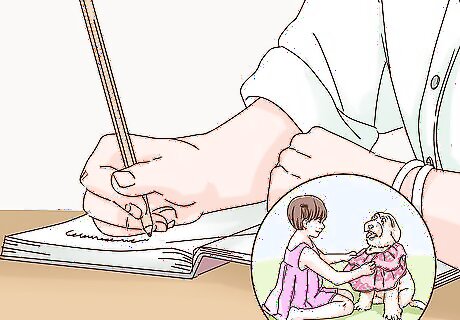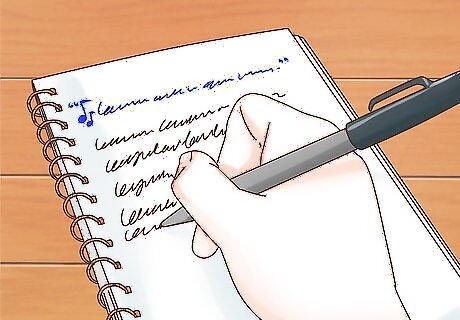
views
Starting a Song

Brainstorm specific themes, subjects, or experiences to write about. A good way to start a song is to pick something for the song to center on. If you can focus on an emotion about a certain thing, or some aspect of society that affects you, it can make writing lyrics easier. Avoid general topics in favor of something very specific. Rather than saying, “I’m going to write about love,” you might say, “I’m going to write about the first crush that I remember and what that felt like.” Instead of aiming to write a song that is sad in general, think of when you lost a loved one, or even when someone you know lost someone, and write about the specific experience of that.

Write a letter to a friend about something you’re passionate about. This is a good way to get lots of ideas down quickly. Think of what you care deeply about, maybe a social issue or a recent news event, and tell your friend all about it. Write as much as you can. Then go through and pick out phrases and lines that stand out. You can work these phrases into a song, adding new lyrics as needed. For example, let’s say your best friend just moved to another state and you won’t see them for a year. Write a letter telling them how important they have been to you and what you will miss most about them. You can then highlight the best sections and form those into a song. Or choose a social issue, like the water crisis throughout much of the world, and write to a friend telling them why you care about that issue. The emotions you express in the letter can make great lyrics for a song about how you want to see things change.

Tell a story about a memory from childhood. Songs that tell a specific story can be a good option when you are starting out, because they don’t rely on abstract ideas. Think of a specific happy or sad memory from when you were young and write an account of it. Narrow down the story and arrange it into song form. For example, write about a unique camping trip you took with your father when you were young, before your siblings were born. Tell of the fun you had and how things changed some once there were more kids in the family. You could write about a time when you got lost in the mall and had to wait for your mom to come get you. You can relate it to how you still feel lost sometimes. You could also tell the story from an outside perspective, as if it happened to someone else rather than you, which may help you explore the story more objectively.

Start with the music. Many songwriters who are good at an instrument will start by coming up with a melody, even if it is just a few seconds long, and writing lyrics that fit the tone of the music. Having a tune in mind may give you the inspiration you need to write the lyrics. Ask yourself what the music makes you think of and feel. Work the lyrics around that. If you have a tape recorder, an app on your phone, or music software on the computer, you can record the music. If not, you can just play it multiple times through and write the lyrics you think of as you go. You could also listen to an instrumental piece by a professional musician and let it inspire lyrics for your song. Then you can go back and write new music to fit those lyrics, maybe something similar to what you listened to. If you don’t play an instrument and writing actual music is not an option, try whistling, humming, or making instrument sounds with your mouth. This can give you a rhythm or tune without using an instrument.

Craft a catchy hook. The hook is typically the part of the song that draws you in, and is often repeated multiple times as the chorus. If you get a solid chorus that emphasizes the main point of the song, you can use it as a central theme for the song, building the verses around the chorus. A good hook usually can’t carry a bad song, but it can be enough to draw listeners in if the rest of the song supports the hook. If you are working on some lyrics, try to pick out the phrase or set of lines that says most clearly what you want to say. This is probably what you want to use for the chorus. If one line of the song was the only thing people heard, which line would you want it to be? There’s your hook. Think of classic songs and what makes the hooks so memorable. There’s The Beatles, “I wanna hold your hand,” which is simple and to the point. More recently, think of how Carly Rae Jepsen’s, “here’s my number, call me maybe,” got consistently stuck in your head. A hook is the part of the song you want to get stuck in your listeners’ heads.
Expanding a Song

Keep a running list of lyrics in a note app or on paper. Since song ideas come at all times, like when you are riding the bus to school, getting off the soccer field after practice, or raking leaves in your yard, make a habit of writing everything down. Carry a notebook or use a memo app on your phone. Every few days, read through what you have written and see if you can expand on something. You might come up with the lyric “you’re like a shirt that doesn’t fit,” but at the moment, it seems not to mean anything. If you look at it a week later, maybe you’ll have an idea for how to write a whole song around that idea. Or that line may fit into another song you are working on. If you don’t keep a specific memo that has all your ideas, you may misplace them, so it works best if you always jot them down in the same place. As an exercise, once in a while, sit down and make yourself write a song using one of these small phrases. You may actually come up with more than you would have thought.

Maintain your own perspective. Teenagers often want to think about being older, but it can be helpful to stay firmly planted in your experience as a teen. You know how you are feeling and what goes on in your life right now, so use that. People that are older often lose the memory of what being young is like, so take advantage of it. On the other hand, sometimes it is a good exercise to really try to get outside of yourself and write from the perspective of someone else. You could try writing a song of what you wish someone older would tell you.

Capture images with your words. Think of your favorite song, and pick out what parts of the song make you see specific pictures in your mind. This is a great technique when trying to figure out what to write. You want your song to show people images of what you are talking about, so try to use concrete descriptions. For example, you want to describe a girl sitting alone in her room. Tell what her room looks like: pink walls painted before she was born, stuffed animals abandoned in the corner long ago, postcards of places she has never been covering the walls. These details make the image more vivid. Try to describe a beautiful place you have visited, including every color and feature you can think of. Images like this put people in the place you are describing.

Rewrite the song after the first draft. Often the first round of a song is not what becomes the final copy. You have to get your ideas out first, and then you can go through and see how to rework it. You may switch verses around, find a better way to word something, or add a section you didn’t think of the first time. Editing and reworking a song doesn’t mean it’s no good. It means you think you can make it better. Make sure you keep the original copy, as you are changing things, because you may end up liking that version better than what you come up with later. It can also be helpful to put the song aside for a few days or a week and come back to it fresh to see what you might want to change. If you can get your point across with fewer words, this is usually a good idea. Thoughts and lines that try to say too much can be hard to work into a rhythm.

Let everything inspire you. Topics for songs are around you constantly, if you allow yourself to really see and consider the world. Snow falling, dropping your books in the hall, the swing of a golf club, a homeless man on the street are all worth writing a song about if you have something to say about them. Don’t discount any experience as unfit for inclusion in a song. Great songs are often about simple, even boring, occurrences, but they are written in such a way that makes them interesting and beloved. For example, you could write about a carwash: “I’m trapped inside, water rushing over me, but I’m here, and now I’m coming clean.” It’s an everyday thing, but you can give it deeper meaning. Think of a book, TV show, or movie you love and try to write a song about one of the characters, or from the perspective of one of the characters. One example is "Snoopy's Christmas" by the Royal Guardsmen.

















Comments
0 comment